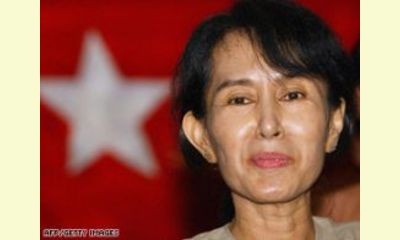|
|
Burma: Suu Kyi confirms run for parliament seat
un articulo por Norwegian Helsinki Committee (excerpts)
Myanmar opposition leader Aung San Suu Kyi confirmed that she will run for a seat in parliament, her party said Tuesday [January 20], a move that will infuse April by-elections with legitimacy, star power and historic significance. Suu Kyi said last year that she would run for parliament but had appeared to backtrack since then. A victory would give the Nobel Peace Prize winner and longtime political prisoner a voice in parliament for the first time in her decades-long role as the country’s opposition leader.

Suu Kyi
Copyright: Stephen Shaver, AFP, Guardian
click on photo to enlarge
Suu Kyi’s decision to personally contest the April polls is the latest vote of confidence for government reforms that include the legalisation of labour unions, increasing press freedom and opening a dialogue with Suu Kyi herself. Party spokesman Nyan Win said Tuesday that Suu Kyi announced during a party meeting on Monday that she would seek a parliamentary seat in the Yangon suburb of Kawhmu. Yangon is Myanmar’s largest city and Suu Kyi’s hometown . . .
The rising optimism in the country stems mainly from the fact that new president appears to be genuinely committed to reforms. He has not only made policy statements calling for political reconciliation, strengthening of democratic practices and economic reforms, but also followed them up with action. He has taken the extraordinary step of meeting with Ms Suu Kyi and inviting her to dinner in the new presidential residence. Observers agree that the photograph that appeared in Myanmar papers, of President Thein Sein standing with Ms Suu Kyi in front of the official portrait of General Aung San, her father and a national hero, sends a positive signal. Ms Suu Kyi herself has confirmed that there is a sense of spring in the air. In her speech marking the International Day of Democracy, she told her audience: "I believe we have reached a point where there is opportunity for change." She also told AFP the new government appeared genuine in its desire for democratic reform, and that an Arab-style uprising was not the answer to the country's problems.
Myanmar's economy too is beginning to stir from the deep slumber of decades of stagnation brought about first by General Ne Win's misguided policies and his experiment with "The Burmese Way to Socialism" and subsequently the sanctions imposed by the US and EU . . .
Since coming to power in March, the new military-backed government, dominated by former generals, has made a series of reformist moves in an apparent attempt to reach out to political opponents and the West. These included releasing hundreds of political prisoners, holding dialogue with the opposition, suspending construction of an unpopular "mega-dam" and pursuing peace deals with armed ethnic minority rebels.
The NLD won an election in 1990 by a landslide, while Suu Kyi remained under house arrest, but the ruling generals never allowed the party to take power. A total of 48 seats are up for grabs in the April vote, not enough to threaten the resounding majority held by the ruling party . . .
|








|
DISCUSSION
Pregunta(s) relacionada(s) al artículo :
Is there a new international generation of human rights activism?,
* * * * *
Comentario más reciente:
:
CPNN has been enriched over the years by the young human rights activists who take part in the Annual UNESCO International Leadership Forum. This is truly the hope for our future!

|
|









